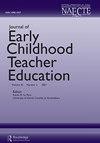新冠肺炎疫情封城期间职前幼儿园教师远程教学实践
IF 1.3
Q3 EDUCATION & EDUCATIONAL RESEARCH
Journal of Early Childhood Teacher Education
Pub Date : 2022-05-19
DOI:10.1080/10901027.2022.2075813
引用次数: 1
摘要
摘要本研究考察了幼儿保育教师在新冠肺炎封锁期间选择的与幼儿园学生合作的远程教学实践。这项研究涉及32名在以色列教师培训机构学习的女职前教师。本研究采用定性研究方法。数据分析显示,职前教师可分为三类:(a)采用远程教学的教师(12.5%),(b)发送异步信息的教师(21.8%),(c)和发起远程教学活动的教师(65.6%),以及职前教师的技术技能。研究结果显示,职前教师在应变能力和效能方面存在差异,包括创造力、耐力、独立性、灵活性,以及在数字环境下的电子教学准备程度。这些差异影响了远程教学实践的选择。在新冠肺炎封锁期间,向研究参与者传授在这种环境中工作的知识、工具和技能可能会导致更重要的教学。本文章由计算机程序翻译,如有差异,请以英文原文为准。
Preservice kindergarten teachers’ distance teaching practices during the COVID-19 lockdown period
ABSTRACT This study examined the distance teaching practices that early childhood preservice teachers chose for working with kindergarten students during the COVID-19 lockdown. The study involved 32 female preservice teachers studying at teacher training institutions in Israel. The study used the qualitative research method. The data analysis revealed that preservice teachers could be divided into three categories: (a) those who adopted distance teaching (12.5%), (b) those who sent asynchronous messages (21.8%), (c) and those who initiated activities distance teaching (65.6%). Participants raised three issues: (a) communication and interactions, (b) characteristics of the preservice teachers, and (c) attitudes, tools, and technological skills of the preservice teachers. The findings revealed differences in the resilience and efficacy of the preservice teachers, including creativity, endurance, independence, flexibility, and the degree of e-readiness for teaching in a digital environment. These differences affected the choice of distance teaching practices. Imparting knowledge, tools, and skills for working in this environment could have led to more significant teaching during the COVID-19 lockdown period by some of the participants in the study.
求助全文
通过发布文献求助,成功后即可免费获取论文全文。
去求助
来源期刊

Journal of Early Childhood Teacher Education
EDUCATION & EDUCATIONAL RESEARCH-
CiteScore
2.20
自引率
16.70%
发文量
27
期刊介绍:
The Journal of Early Childhood Teacher Education, the official journal of the National Association of Early Childhood Teacher Educators, publishes original manuscripts, reviews, and information about association activities. Its purpose is to provide a forum for consideration of issues and for exchange of information and ideas about research and practice in early childhood teacher education. JECTE welcomes research reports, position papers, essays on current issues, reflective reports on innovative teacher education practices, letters to the editor and book reviews.
 求助内容:
求助内容: 应助结果提醒方式:
应助结果提醒方式:


